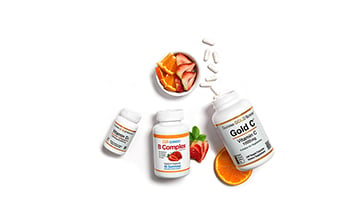Sådan Vælger Du Vitaminer Og Kosttilskud Af Høj Kvalitet: En Komplet Guide

Vitamin- og mineraltilskud er værdifulde komponenter i et afbalanceret wellness-regime, der hjælper med at udfylde ernæringshuller for dem med begrænset kost, eller som har brug for yderligere ernæringsmæssig støtte til visse tilstande eller sygdomme. Men med så mange muligheder og mærker på markedet kræver det nøje overvejelse at vælge et supplement af høj kvalitet.
Ikke alle kosttilskud er skabt ens med hensyn til biotilgængelighed, ingredienskvalitet, sikkerhed, nøjagtighed og effektivitet. Og da Food and Drug Administration (FDA) kun giver begrænset tilsyn og regulering af supplementindustrien, er forbrugernes årvågenhed afgørende, når man vurderer produktkvalitet og sikkerhed.
Læs videre for at forstå, hvad du skal kigge efter, når du vælger vitaminer og kosttilskud af høj kvalitet, vigtigheden af tredjepartstest for forbrugernes sundhed og sikkerhed og iHerbs forpligtelse til at arbejde direkte med velrenommerede mærker for at skaffe sikre, autentiske produkter af høj kvalitet, du kan stole på.
Hvad er kosttilskud, vitaminer og proprietære blandinger?
Når du køber kosttilskud af høj kvalitet, vil du sandsynligvis støde på de almindelige udtryk „kosttilskud“, „multivitamin“ og „proprietær blanding.“ Men hvad betyder de nøjagtigt, og hvordan adskiller de sig fra hinanden? Her er en hurtig forklaring:
- Kosttilskud: Fremstillede produkter, typisk i kapsel, tyggegummi, tinktur eller pulverform, designet til at supplere ens kost med næringsstoffer, der enten ekstraheres fra en fødekilde eller fremstilles syntetisk. Kosttilskud kan omfatte vitaminer, mineraler, botaniske stoffer eller urter, aminosyrer, levende mikroorganismerog stoffer som enzymer, tilbehør næringsstoffer og metabolitter.
- Vitaminer eller multivitaminer: Kosttilskud giver mikronæringsstoffer som vitaminer og mineraler, der er nødvendige for optimal sundhed.
- Proprietære blandinger: I denne type supplement ejer virksomheden rettighederne til en unikt skabt blanding og behøver lovligt ikke at videregive ingredienserne til forbrugerne.
Hvem skal tage kosttilskud?
Registrerede diætister anbefaler normalt at indtage næringsstoffer gennem hele fødevarer først, før de går over til kosttilskud. Multivitaminer, der indeholder vitaminer og mineraler, kan dog hjælpe med at udfylde ernæringsmæssige huller for mennesker, der måske ikke opfylder deres krops behov gennem mad alene. Mens kosttilskud ikke bør erstatte vanen med sund kost, kan mennesker med begrænset kost, visse sundhedsmæssige forhold eller tage visse lægemidler især drage fordel af næringstilskud.
Mennesker, der bør tage et multivitamin:
- Mennesker, der spiser en diæt begrænset i variation
- Kvinder, der er gravide, ammer, efter fødslen eller forsøger at blive gravide
- Mennesker med en helbredstilstand, der har brug for yderligere ernæringsmæssig støtte
- Personer med en specifik næringsstofmangel, som det fremgår af laboratoriearbejde, såsom vitamin D eller jern
- Folk, der tager visse lægemidler, der kan nedbryde kroppen for vigtige næringsstoffer
- Spædbørn og småbørn, der har brug for yderligere ernæringsmæssig støtte
- Ældre voksne, der har brug for yderligere ernæringsmæssig støtte
- Veganere og vegetarer, der har brug for et vitamin B12 supplement, da plantebaserede fødevarer naturligt mangler dette vitamin
Begrænset FDA-regulering for kosttilskud
Når du vælger kosttilskud, er det vigtigt at huske på, at de ikke er reguleret så tæt som mad og medicin. Mens Food and Drug Administration (FDA) fører tilsyn med supplementindustrien, falder ansvaret for at sikre kosttilskudssikkerheden stort set på kosttilskudsvirksomhederne selv.
Dietary Supplement Health and Education Act (DSHEA) er en føderal lov, der regulerer kosttilskud i USA. Loven fastlagde retningslinjer for FDA til at føre tilsyn med supplementindustrien. Federal Trade Commission (FTC) regulerer reklame for kosttilskud.
Ifølge FDA, „FDA har IKKE myndighed til at godkende kosttilskud for sikkerhed og effektivitet eller til at godkende deres mærkning, før kosttilskuddene sælges til offentligheden.“ Endvidere „er det kosttilskudsselskabernes ansvar at sikre, at deres produkter opfylder sikkerhedsstandarderne for kosttilskud og på anden måde ikke er i strid med loven.“1
For at hjælpe med at sikre forbrugernes sikkerhed er kosttilskudsselskaber forpligtet til at levere nøjagtig mærkning, herunder et suppleringsfaktapanel, ingrediensliste, portionsstørrelse, antal portioner pr. beholder og klar produktidentifikation på etiketten, såsom „urtetilskud“, „homøopatisk supplement“ eller „kosttilskud.“
Derfor bør forbrugerne være opmærksomme, når de køber kosttilskud. Vælg kun kosttilskud fra velrenommerede virksomheder, der følger god fremstillingspraksis, udfører tredjepartstest og mærker deres produkter korrekt.
Ting at kigge efter i et tillægsmærke
Du kan lære meget om et supplement og firmaet, der lavede det ved at læse etiketten og emballagen. Læs altid supplementfaktapanelet og ingredienslisten, før du indtager et supplement for at sikre, at det er sikkert og effektivt, følger god fremstillingspraksis og er fri for kunstige tilsætningsstoffer. Nedenfor er specifikke ting, du skal kigge efter, når du vælger et supplement:
- Portionsstørrelse: Sørg for, at den anbefalede portionsstørrelse er bæredygtig og realistisk. Mens nogle kosttilskud anbefaler en kapsel om dagen, kan andre anbefale op til otte kapsler eller mere dagligt.
- Vejledning: Forstå, om tilskuddet skal tages sammen med mad eller på tom mave. Og følg anvisningerne til opbevaring - nogle kosttilskud skal opbevares på et køligt, tørt sted, som et skab eller i køleskabet, efter åbning.
- Ingrediensliste: Sørg for, at tilskuddet er fri for kunstige farver og farvestoffer, kunstige smagsstoffer, fyldstoffer, bindemidler, potentielle allergener eller store mængder tilsat sukker.
- Udløbsdato: Vær opmærksom på holdbarheden af tillægget, og sørg for, at det ikke er udløbet.
- Kvalitets- og sikkerhedsforseglinger: Kosttilskud skal lukkes med en ordentlig forsegling for din sikkerhed. Disse forseglinger sikrer, at tillægget er blevet testet og forseglet af tredjepartsorganisationer som National Sanitation Foundation (NSF) eller United States Pharmacopeia (USP).
- GMP-certificering: En GMP-certificering betyder, at virksomheden følger god fremstillingspraksis, herunder overholdelse af regler, tredjepartstest og audit og sikret kvalitet og sikkerhed gennem hele fremstillingsprocessen.
Hvad skal man undgå på et tillægsmærke
Ud over hvad man skal kigge efter, når man vælger et supplement, er det vigtigt at vide, hvad man skal undgå. Hvis du ser et af følgende på et tillægs emballage eller ingrediensliste, skal du vælge et andet supplement eller mærke:
- Kunstige farver og farvestoffer
- Kunstige smagsstoffer
- Overdrevne medicinske eller sundhedsmæssige påstande
- Implikationer for „behandling“ af enhver sundhedstilstand
- Manglende fakta om tillæg
- Manglende ingrediensliste
- Manglende dosering og instruktioner
- Mangel på en ordentlig forsegling af sikkerhedshensyn
Betydningen af tredjepartstest
Af hensyn til forbrugernes sikkerhed udfører kosttilskud af høj kvalitet tredjepartstest af uafhængige organisationer som NSF, USP, Banned Substances Control Group (BSCG) eller ConsumerLab. Tredjepartstest sikrer, at et supplement er fri for skadelige konserveringsmidler, pesticideksponering, tungmetaller og usikre kemikalier. Tredjepartslaboratorier tester også for at sikre, at næringsstofniveauer, der er anført på etiketten, er nøjagtige, aktive ingredienser er rene, og virksomheden overholder industristandarder for sikkerhed og fremstilling.
Fordi kosttilskudsindustrien modtager minimalt tilsyn og regulering fra FDA, giver tredjepartstest ro i sindet for forbrugerne, hvilket sikrer, at virksomheder overholder bedste praksis og tilbyder sikre produkter.
Sammenligning af GMP og GLP
GMP-certificeret og GLP-kompatibel lyder ens, men de henviser til forskellige stadier af tillægsproduktionsprocessen for sikkerhed og nøjagtighed.
Good Manufacturing Practices, eller GMP, er et sæt retningslinjer, virksomheder skal følge for at sikre kvaliteten af produkterne, især for farmaceutiske og fødevarevirksomheder. Virksomheder, der følger disse retningslinjer, kan modtage et certifikat, der annoncerer, at de er GMP-certificerede. Du kan også se udtrykket GMP-kompatibel, hvilket betyder, at virksomheden følger GMP-regler, retningslinjer, god fremstillingspraksis og kvalitetsstandarder, men har ikke gennemført yderligere trin for at modtage officiel certificering.
God laboratoriepraksis, eller GLP, indebærer overholdelse af et sæt regler og retningslinjer under laboratorieforskning og -undersøgelse. Dette omfatter overvågning af forhold, processer, dokumentation, dataintegritet og pålidelighed og arkivering af undersøgelser udført i laboratoriemiljøer.
Almindelige bekymringer og potentielle risici ved kosttilskud
Mens det at tage de rigtige kosttilskud i den rigtige mængde kan forbedre ens helbred, kan indtagelse af de forkerte kosttilskud i den forkerte mængde gøre mere skade end gavn. Kosttilskud med vildledende påstande, unøjagtig dosering eller fejl i ingrediensetiketten kan øge risikoen for interaktioner, toksicitet, risici og ineffektivitet for forbrugerne.
Endvidere kan virksomheder, der ikke følger sikre fremstillingsprocesser eller udfører tredjepartstest, øge risikoen for at udsætte forbrugerne for høje niveauer af tungmetaller, pesticider eller andre kemikalier, der kan have alvorlige sundhedsmæssige konsekvenser.
Potentielle negative bivirkninger af kosttilskud omfatter:
- Allergisk reaktion
- Leverskade
- Organskade
- Skader på nervesystemet
- Nyresten
- Hjerteproblemer
- Øget risiko for blødning
- Medicin-næringsstofinteraktioner
- Reduceret effektivitet af medicin
- Reduceret effektivitet af anæstesi
- Fosterudviklingsabnormiteter
- Åndenød
- Udslæt
- Svimmelhed
- Sløret tale
- Kvalme
- Opkastning
- Hovedpine
- Forstoppelse
- Diarré
iHerb's løfte om at levere produkter af høj kvalitet
Ud over at købe kosttilskud fra et velrenommeret mærke, er det vigtigt at købe dem fra en velrenommeret shoppingkilde for at sikre, at de ikke er blevet manipuleret med, åbnet eller er forfalskede. Kort sagt, hvor du handler betyder det, at undgå at købe falske kosttilskud.
Når det kommer til at handle kosttilskud sikkert, tager iHerb adskillige skridt for at sikre, at dets produkter er af høj kvalitet og sikre. iHerb arbejder direkte med mærker, der følger tredjepartstest for kvalitetssikring for at sikre, at kosttilskud er autentiske og sikre. iHerb sikrer også, at alle produktanmeldelser er fra verificerede købere for at undgå vildledende eller svigagtige anmeldelser. Og da faktorer som temperatur og fugtighed kan påvirke kosttilskudets virkning, styrke og effektivitet, leverer iHerb direkte forsendelse fra et klimakontrolleret lager for at sikre produktets friskhed.
I årevis har iHerb været en pålidelig kilde til produkter af høj kvalitet til den bedste værdi. De tilbyder over 50.000 pålidelige sundheds- og wellnessprodukter af høj kvalitet.
Referencer:
- FDA 101: Kosttilskud | FDA. Tilgået 13. april 2025. https://www.fda.gov/consumers/consumer-updates/fda-101-dietary-supplements
ANSVARSFRASKRIVELSE: Wellness Hub har ikke til hensigt at stille diagnoser...

















































































 Indholdsfortegnelse
Indholdsfortegnelse











